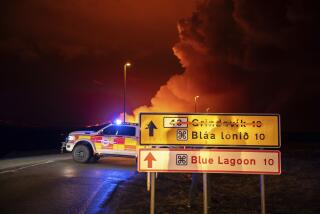Iceland volcano: Ash cloud over Europe may be easing up -- for now, forecasters say
With Iceland‘s Grimsvotn volcano no longer spewing ash, officials on Wednesday cautiously predicted a reprieve from the ash cloud that closed air space and idled planes this week in parts of Britain and the Continent.
Earlier Wednesday, about 450 flights were canceled in Germany, affecting airports in Bremen, Hamburg and Berlin. The three airports reopened later in the day.
Now the British Meteorological Office expects minimal ash over the Britain and the Continent for the next few days, good news for British travelers this weekend who have Monday off as a national holiday. Air traffic agency Eurocontrol also says it doesn’t expect the cloud to have a big impact on European air space Thursday.
But everything could change if Grimsvotn reawakens and weather patterns shift. The British Geological Survey has asked the public to help monitor the distribution of the ash cloud by taking an online survey and collecting samples. This map records the observations so far.
And the consistency of that volcanic ash plays a role in delays too. Ed Daly, director of watch operations for iJet Intelligent Risk Systems, says wind direction and particle size are key to determining safety risks for planes and the length of flight disruptions. For example, the fine dust from the eruption of Eyjafjallajokull in April 2010 was light and remained in the atmosphere a long time. Grimvotn’s ash is heavier and falls to the ground more quickly, allowing airports to reopen sooner.
But it’s too early, Daly says, to gauge whether Grimsvotn will turn out to be as disruptive as Eyjafjallajokull, which closed Europe’s air space for five days and stranded thousands of travelers.
Daly offers these lessons learned from the last volcanic eruption that could help European travelers whose journey might be affected by this year’s ash cloud:
--Buy travel insurance that covers flight cancellations.
--Take trains to cities you want to visit when flights are canceled.
--Have supplemental funds, whether it’s increasing a credit line or carrying more cash, in case you wind up away from home longer than expected.
More to Read
Sign up for The Wild
We’ll help you find the best places to hike, bike and run, as well as the perfect silent spots for meditation and yoga.
You may occasionally receive promotional content from the Los Angeles Times.







